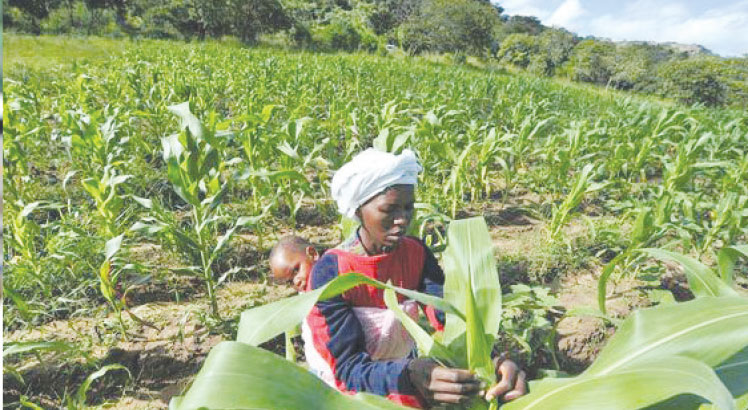Future bleak for small holder farmers—study
Two studies by the Agriculture Policy Research in Africa (Apra) on the political economy of agricultural value chains and commercialisation experiences of smallholder farmers, paint a bleak picture about the future of smallholder farmers in Malawi.
The first study, which had particular focus on groundnuts, shows that the majority of smallholder farmers are being displaced by emerging urban middle-class farmers, who are buying and consolidating land, especially in rural districts.
The second study, which examined commercialisation experiences of smallholder farmers over a 10-year period, found that the majority of these farmers are either hanging in or dropping out of agriculture, and rarely engage with markets on a sustainable commercial basis.
An analysis of the two studies, published on Monday and written by Professor Blessings Chinsinga and five others, observe that land available to smallholder farmers is steadily diminishing.

According to the analysis, latest estimates indicate that land per capita is projected at 0.33 hectares; that 76 per cent of smallholder farmers work on less than a hectare and about 30 per cent work on less than half a hectare.
It shows that agricultural productivity is very low despite increased use of organic fertiliser; and 42 per cent work on farms where sustainable intensification may not be possible with existing on-shelf agricultural production technologies.
“The foregoing statistics indicate that Malawi is rapidly turning into a non-producing and vending economy. The sluggish growth of the agricultural sector implies that it cannot fully absorb Malawi’s predominantly youthful population.
“About two-thirds of the population is under 24 years and 45 per cent is under 15 years,” it reads.
The Chinsinga and others’ analysis on the two studies shed some light on the factors that have conspired to make the future of smallholder farmers in Malawi challenging.
It adds: “There has been an acceleration of local land grabs, although externally driven land grabs are also an issue. The emerging urban middle-class farmers, popularly referred to as ‘weekend farmers’ or ‘phone farmers’, are pushing smallholder farmers out of their land.
“This dynamic is creating a new group of farmers owning 5-10 hectares [ha]. It is estimated that currently about 78 per cent of smallholder landholdings stand at about 0.59 ha. Smallholder farmer productivity is stagnating due to the dominance of subsidies, largely propelled by electoral political considerations by successive governments since the late 1990s.”
The emphasis on subsidies, it laments, has resulted in total neglect by the Ministry of Agriculture of activities such as research and development, education and infrastructure which generate the greatest return on investment.
It says all the key policies that have been developed in recent years prioritise, if not reify, large-scale agriculture as the surest way for Malawi to achieve fundamental and sustainable structural transformation.
Key examples include the Malawi Growth and Development Strategy III; the National Export Strategy; and the Malawi 2063.
They observe these policy frameworks promote a dominant narrative that suggests that smallholder farmers are no longer viable and that they belong to the economy of yesterday.
It warns that the future of smallholder farmers will greatly depend on the robustness of policy measures that can be put in place, indicating, it was difficult to imagine the future of Malawi’s agriculture without smallholder farmers.
It suggests several policy measures that would ensure that smallholder farmers remain an integral part of Malawi’s transformation agenda, including stepping up policy measures which would include ensuring a stable macro-economic framework, provision of key public goods, viable financial, rural governance systems, and more.
Recently, Minister of Agriculture Lobin Lowe asked policymakers to pursue policies and strategies that will help to address challenges the agriculture sector is facing and help develop resilience.
He said this when opening a day-long virtual meeting on the future of smallholder farming in organised by the Malawi Agriculture Policy Advancement and Transformation Agenda (Mwapata) in collaboration with the National Smallholder Farmers Association of Malawi (Nasfam).
He said there are problems such as climate change that are affecting contributions of the agricultural sector towards Malawi’s development agenda, adding his ministry is eager to pursue policies that focus on transforming smallholder farming.
It is estimated that agriculture employs about 70 per cent of the population, compared to the eight (8) per cent employed in the industrial sector, for example, and the service sector is increasingly employing more people, estimated at 20 per cent.





